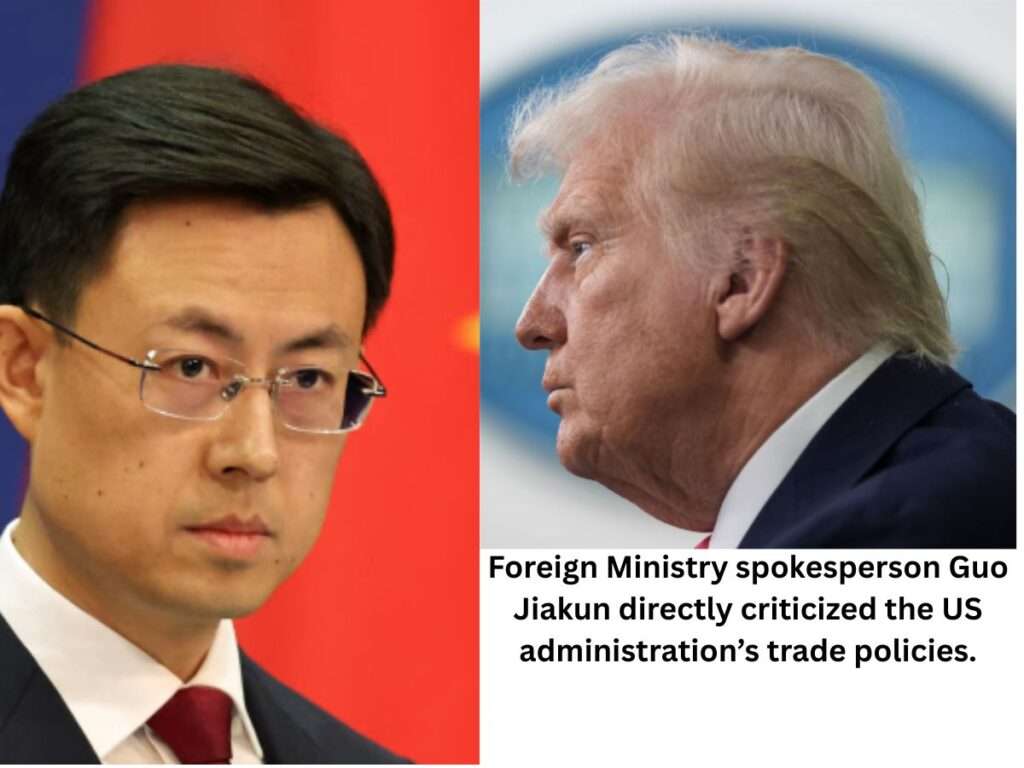China Condemns Trump: In an alarming turn of events that shook global financial markets, China has issued a scathing statement condemning the United States’ latest tariff policies under former President Donald Trump. The move came just hours after US stock indices suffered their most severe single-day collapse since the COVID-19 pandemic, wiping out over $5 trillion in market value.

On Friday, April 4, 2025, the Dow Jones Industrial Average, Nasdaq Composite, and S&P 500 all posted significant losses, triggered by China’s announcement of 34% additional tariffs on all US imports—an aggressive retaliatory measure set to take effect on April 10. The timing and scale of the response have drawn widespread attention and raised new concerns about the fragility of global trade.
🔻 China Condemns Trump: A Market in Meltdown- Worst Crash Since COVID-19
Wall Street’s reaction to China’s tariff announcement was swift and brutal. All major US stock indices fell sharply:
- Dow Jones Industrial Average: Dropped by 2,231 points (-5.50%), closing at 38,314.86
- Nasdaq Composite: Lost 962.82 points (-5.82%), ending at 15,587.79
- S&P 500: Fell 322.44 points (-5.97%), closing at 5,074.08
This crash marked the largest single-day loss since the March 2020 pandemic-driven panic. The sell-off reflects growing investor fears that the renewed trade war could disrupt global supply chains, inflate commodity prices, and stall economic recovery in multiple regions.
According to analysts, over $5 trillion in market capitalization was erased in just one trading session.
🛃 China Condemns Trump: The Trigger- Trump’s Reciprocal Tariffs
The market turmoil can be traced back to April 2, when Donald Trump announced a new round of reciprocal tariffs aimed at protecting American industries. These tariffs applied not just to China, but also to several other trading partners, signaling a broad escalation in the former president’s long-standing protectionist agenda.
Trump, in his announcement, claimed that the tariffs were necessary to counter years of “unfair trade practices” and bring jobs back to the United States. However, the abrupt nature of the policy—combined with a lack of diplomatic groundwork—sent shockwaves through international markets.
China, which remains one of the largest trading partners of the US, responded two days later with an across-the-board tariff hike targeting all American goods entering the country. The announcement was made just before US markets opened on Friday, setting the stage for the day’s financial bloodbath.
China Condemns Trump: 🇨🇳 China’s Strong Response: “Unprovoked and Unjustified”
China’s reaction was not limited to economic retaliation. In a bold statement issued on Saturday, April 5, Foreign Ministry spokesperson Guo Jiakun directly criticized the US administration’s trade policies.
In a social media post, Guo said, “The US’s trade and tariff war against the rest of the world is unprovoked and unjustified.” “The United States needs to stop acting in an inappropriate manner and use equal-footed consultation to settle its differences with trading partners.”
The language used by China’s Foreign Ministry marks one of the strongest public condemnations of American trade policy in recent years. It also highlights Beijing’s strategy of positioning itself as a rational actor seeking dialogue, in contrast to what it portrays as unilateral aggression by Washington.
China Condemns Trump: 🇺🇸 Trump’s Response: Confidence Amid Chaos
Despite the market turmoil, Donald Trump appeared unfazed. In a Truth Social post shared on Friday, the former president attempted to reassure investors and downplayed the crash:
“My policies will never alter for the numerous investors that come to the United States and make enormous financial investments. There has never been a better moment to become wealthy than now!
While his supporters praised the message for projecting confidence, critics argue that such rhetoric ignores the real concerns of investors and global markets alike. Several financial experts have warned that sustained instability in trade relations could lead to long-term economic consequences, including a slowdown in investment, rising inflation, and weaker consumer demand.
🌍 China Condemns Trump: Global Reactions and Economic Implications
The US-China trade standoff has once again put international markets on edge. European and Asian stock exchanges also experienced minor tremors following the Wall Street crash, though not as severe. Economists warn that if the situation escalates, the ripple effects could hit developing economies hardest, especially those reliant on exports and manufacturing.
The International Monetary Fund (IMF) issued a brief statement urging both countries to pursue “dialogue over confrontation,” emphasizing that open trade is critical to global growth and stability.
Meanwhile, companies in sectors such as technology, agriculture, and manufacturing—many of which rely on international supply chains—are scrambling to assess the potential impact of new tariffs. Many fear that costs will be passed on to consumers, which could dampen consumer spending and weaken economic momentum.
🧠 China Condemns Trump: What Happens Next?
While neither the US nor China has signaled an immediate willingness to de-escalate, experts suggest there’s still room for diplomacy. Historically, trade conflicts between the two nations have seen periods of intense pressure followed by temporary truces. However, the current environment is made more volatile by the global economic recovery’s delicate nature post-pandemic and ongoing geopolitical tensions in other regions.
If the US and China fail to reach some form of understanding in the coming weeks, economists warn of a potential global slowdown, especially if more countries are drawn into retaliatory trade measures.
✅ Final Thoughts on China Condemns Trump
The events of April 2025 have shown that trade policy is more than just economic—it’s deeply political, with consequences that can reshape markets overnight. As the US-China tariff war intensifies, businesses and investors are left navigating uncertainty on a global scale.
While markets may recover in time, the underlying tensions between the world’s two largest economies won’t disappear overnight. For now, the world waits to see whether cooler heads will prevail—or if this is just the beginning of another major economic conflict.
Stay tuned for updates on global trade developments, market insights, and strategic analysis for navigating uncertain times.
ZERODHA 1) : https://zerodha.com/open-account?c=EJ4366
Angelone 2) : https://tinyurl.com/2gloc3g6 or
Upstox3): https://link.upstox.com/9w4tNo1rK8au7VK47








